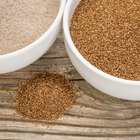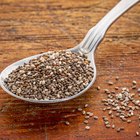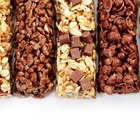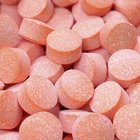
According to the American Dietetic Association, ADA, a daily intake of 20 to 35 g of fiber can reduce the risk of chronic diseases, including obesity, cardiovascular disease, diabetes, diverticulitis and constipation. The typical American diet, however, offers less than half the ADA's recommendation, a result of the lack of fiber in popular conventional foods. Modest increases in whole foods like produce, legumes and whole grains can bring the American diet closer to the recommended amounts. Psyllium is a dietary supplement that can help you achieve this goal.
Psyllium
Psyllium comes from the Plantago plant that grows most commonly in India. It is available in both whole seed and husk form. Both forms are high in soluble and insoluble fibers. Psyllium is used for treatment of intestinal problems, such as irritable bowel syndrome, also known as IBS, because it treats both constipation and diarrhea by regulating intestinal fluid volume. The ground husk is the primary ingredient in many over-the-counter bulk-forming laxative products.
Whole Seed
The European Medicines Agency Committee on Herbal Medicinal Products reported in 2007 on the use of psyllium seeds in clinical research. They concluded that whole seeds were infrequently used in studies, but appeared to have similar therapeutic effects as those produced by the ground husks. Its primary use is as a laxative, and it is composed of mostly indigestible fiber and very limited quantities of digestible sugars. The seeds are capable of absorbing 12 to 19 times their weight in water, which results in increased intestinal volume to produce desired results.
Powdered or Ground Husks
The majority of clinical studies to date have relied on powdered or ground psyllium seed husks. Because ground husks induce a laxative effect more quickly than the seeds, they would be the better choice for bowel irregularity and may account for the preference in clinical use. Like the whole seeds, the husks absorb water to form a gel-like mass that facilitates transport of waste through the digestive tract. The husks have received approval by the FDA for labeling as a food that can reduce heart disease because of their effectiveness at reducing blood cholesterol levels.
Benefits of Psyllium
Both the seeds and ground husks have been linked to a significant reduction in blood cholesterol levels. Additionally, because it provides bulk and increases digestion time that induces a sense of fullness, psyllium may be useful to dieters. Both forms may positively affect intestinal immune function and reduce risk of colon cancer. Psyllium fiber also reduces absorption of food sugars into the blood stream, resulting in reduced risk of both insulin- and non-insulin-dependent diabetes development and reduced hypoglycemic events in individuals with the disease. Its ability to improve gastro-intestinal function and reduce blood cholesterol make it an effective preventative against heart disease and stroke.
Precautions
Talk with your doctor if you are considering adding psyllium to your diet. Psyllium may interact with certain medications or produce allergic reactions in some individuals. Over-consumption of fiber may result in negative health effects, including reduction in absorption of important nutrients. Always drink plenty of water when consuming fiber-rich foods.
Related Articles
How to Substitute Chia for Xanthan Gum

How to Eat Fenugreek

How to Add Chicory to Coffee

Does Benefiber Lower Cholesterol?

What Is White Oat?

Can Herbs Flush Cellulite?

What Is Dye Made From?

What Additives Are in Flour?

Psyllium Husk & Gluten

Golden Flax Seed Vs. Dark Flax Seed

Is Teff Flour Gluten-Free?

Benefits of GMO Foods

Difference Between Canned Pumpkin & ...

Fenugreek for Acne

Can I Substitute Ground Fenugreek for ...

How to Cook With Raw Organic Chia Seeds

The Disadvantages of Saccharin

The Safety of Benefiber

What Is the Difference Between Rolled ...

Benefiber Ingredients
References
- "Journal of the American Dietetic Association"; Position of the American Dietetic Association: Health Implications of Dietary Fiber; , Judith A. Marlett et al.; 2002
- University of Maryland Medical Center; Psyllium; Steven D. Ehrlich; 2009
- European Medicines Agency -- Committee on Herbal Medicinal Products; Assessment Report on Plantago Afra L., Et Plantago Indica L., Semen; Dr C. Werner; 2007
- Mountain Rose Herbs; Psyllium Seed and Powder Profile; Staff; 2011
Writer Bio
Silvia Nena is a certified fitness nutrition coach. She has over eight years experience as a nutrition and fitness instructor, implementing and running workshops for elementary-age students and their parents, as well as working with individual clients. She is the nutrition writer for "San Pedro Today Magazine," covering fitness, nutrition and overall wellness.
Photo Credits
Pixland/Pixland/Getty Images